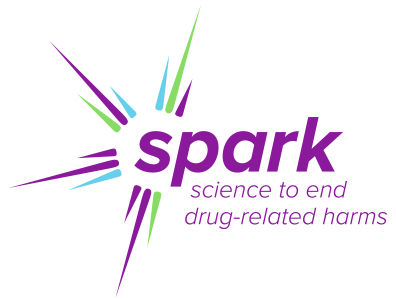An interview with Q2 2020‘s featured Spark affiliated faculty
 Hometown:
Hometown:
Dr. Crawford grew up in Decatur, GA. She went to high school at Druid Hills High School which is near the campus of Emory University.
Undergraduate College & Major/ Minor:
Dr. Crawford went to Spelman College for her undergraduate degree. She then moved to New York to pursue her Master in Public Health (MPH) and PhD in Epidemiology at Columbia University.
Tell me about your journey to study drug-related harms:
Dr. Crawford’s journey to study drug-related harms was initiated through personal experiences with people in her family who struggled with substance use disorders. Then, during her doctoral training, she selected an advisor who was an infectious disease epidemiologist who conducted community-based work with people who use heroin. Before working with this advisor, Dr. Crawford had concerns that epidemiology was entirely population level-based work and did not focus on the communities in which people lived. However, working with this advisor and conducting qualitative research shifted her perspective, because she learned about the people and contexts behind the quantitative numbers. Dr. Crawford developed into a mixed-methods researcher and, although this type of research has its challenges, she loves how it connects her with the everyday lives of individuals. She feels that by conducting this type of research you learn how to best help individuals and their communities.
What is your favorite paper that you have written so far? Why is it your favorite?
Dr. Crawford has two favorite papers. The first is a paper on how social processes increase the risk of transmitting HIV. This was a follow-up paper from her dissertation. Dr. Crawford is especially proud of this work because it is innovative and conveys how social processes can shape disease transmission. It was published in the journal of AIDS and Behavior.
The second paper is focused on a pharmacy intervention that trained pharmacists to provide additional services to people who buy syringes. The paper found that when you train pharmacists, it increases their support for harm reduction services; it also found that these pharmacists were more likely to support these types of harm reduction services in their pharmacies one year after the training. This paper was published in the American Journal of Public Health.
She loves both of these papers because they show how to harness resources in disadvantaged neighborhoods.
What are some of the greatest challenges in your line of work?
The greatest challenge is the concept of “personal responsibility,” which comes up when Dr. Crawford is communicating her research to people who don’t work in harm reduction. People often do not understand addiction as a disease. Therefore, Dr. Crawford dedicates much of her time to educating communities about the disease model of addiction. She explains that anyone can become addicted to drugs and that people who use drugs deserve all our attention and public health resources.
What would you say to someone thinking about developing a career that followed in your footsteps?
Dr. Crawford would tell them to go for it! She would tell them to listen to their inner voice and trust that they have a unique contribution to make. She would reassure them that they can accomplish what she has accomplished by following their heart and by keeping their passion for working with this population at the center of everything they do. However, they should also keep in mind that true success is not about productivity or publications, but about helping people.
